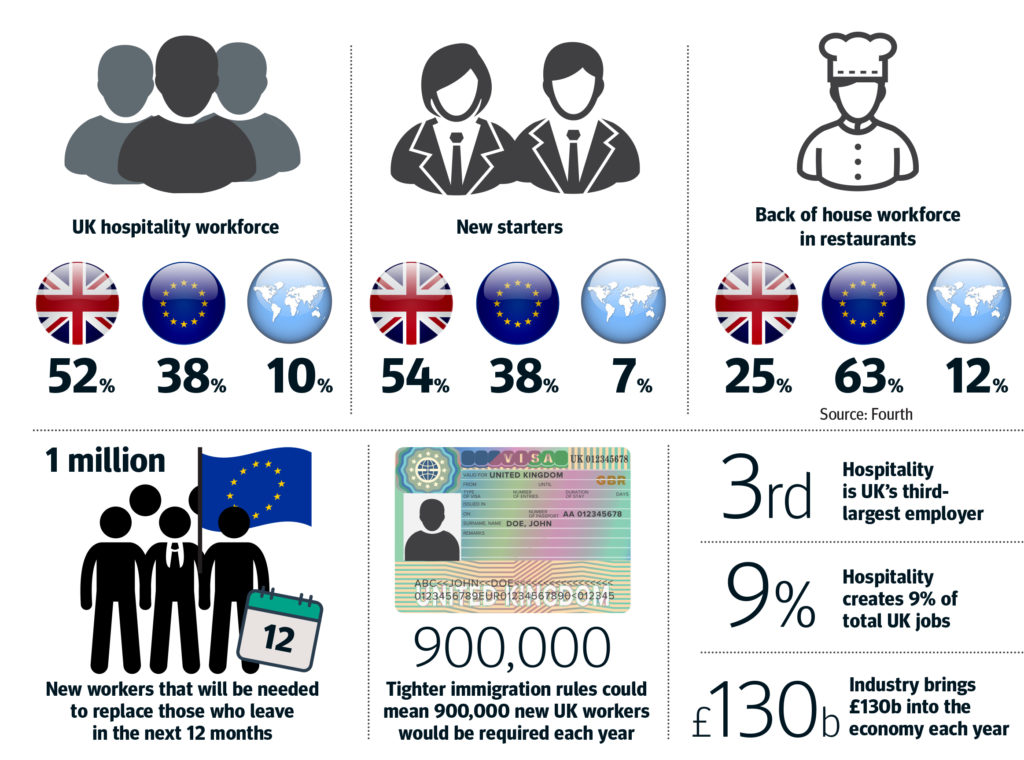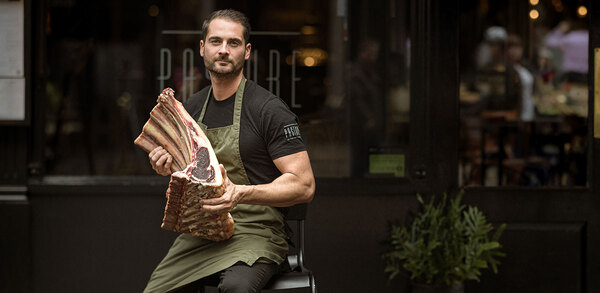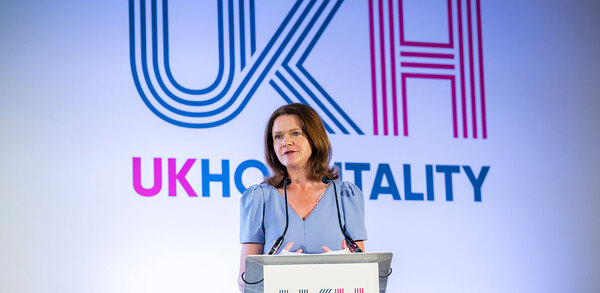An industry in crisis, part one: Why are we sleepwalking into a staffing catastrophe?
Staff shortages have plagued the industry for years, but with the prospect of Brexit and tighter immigration laws, operators are looking for the government to recognise the vital role hospitality plays in the economy. Emma Lake reports
With five months to go until the UK leaves the EU, business leaders have been given no clarity on what a future immigration policy will look like. With the chances of a disorderly no-deal exit mounting, could hospitality be on the edge of a seismic shock from which it cannot recover?
Tighter controls on low-skilled migration post-Brexit could exclude 90% of hospitality's EU workforce, creating a shortfall that would require up to 900,000 new workers to be found each year.
With UK unemployment at 1.36 million as of July this year, the potential impact on the industry could be devastating. Leading figures in hospitality are calling on the government to take notice of a sector which it appears to assume can withstand one hammer blow after another.
As the UK's third biggest employer, approximately three million people work in hospitality, of which varying reports have found between almost a quarter and almost two-fifths (more than one million) are from the EU. No clarity has been given on what we can expect after Britain leaves the EU on 29 March, but a report by the Migration Advisory Committee (MAC) published last month and subsequent statements from the prime minister leave little doubt that "high-skilled" workers will be prioritised (see report).
Last Tuesday (9 October), more than 150 industry leaders travelled to Parliament to push for ministers to ensure that any future policy will include a quick and easy visa system that protects a future hospitality workforce.
Among those lobbying MPs at the UKHospitality-organised event was Peter Borg-Neal, chief executive of pub company Oakman Inns, who told The Caterer: "Personally, I find the government's classification of different skill levels offensive and ill-informed. Are they implying that a multilingual chef is not highly skilled? The thinking is ridiculous and stems from people looking at data rather than reality.
"They seem to believe that if they stop migrants then there will be a movement of people from areas of high unemployment (such as the North-East) to areas where there are a high number of vacancies. It's nonsense. If I could fill my vacancies in Ascot by putting an advert in the Hull Daily Mail, then I would. The fact that unemployed people haven't already migrated is an indication they don't want to. They want jobs where they live. We need people who want to be in our industry and who have the skills. Immigration policy should be decided by the market. If we need more hospitality workers, farm labourers or care workers, that's who we should be allowed access to."
EU workers make a huge contribution to the industry across restaurants, hotels, pubs and bars and contract catering. While the outcome of the 2016 referendum did not see a large-scale exodus of EU workers as some had feared, it is having an impact on the number of people seeking work in the UK.
Jonathan Raggett, group managing director of Red Carnation Hotels, said: "We have far fewer applications for our jobs than we used to. Sadly, a good number of Europeans think they're not welcome, that we don't want them, which makes me want to cry. A lot of my friends and people in our hotels are European. To think that people think that about us is sad and a bit embarrassing."
Corbin & King managing director Zuleika Fennell added: "We are seeing more [of our EU staff] leaving because they are unsure about the future. They don't feel wanted and we have to change that. As far as we are concerned, Corbin & King is open. Our workforce is like the UN, that's part of our magic."
In September, the proportion of EU workers among hospitality's new starters stood at 38.5%, having fallen from 45% over the last 18 months. Over the same period, new starters from the rest of the world increased by just 1%, according to data from Fourth, global software partner to the hospitality and leisure industries.
This is partially offset by a decline in the number of hospitality workers from the EU leaving the industry, a figure that has fallen from 46% of all leavers to 37.5%.
The average staff turnover across the industry stands at 14 months, according to Fourth's data, with an average of one million EU workers leaving the industry each year.
Calvern James, sales manager at Caterer.com, says that fewer applications from EU nationals are being received and that industry growth has outstripped the candidate market, but the industry should not underestimate its resilience.
He explains: âSkill shortages have been around for years. The industry is extremely resilient; we went through the recession and what weâve seen since is huge growth over the last five years â" 400,000-plus people entered the hospitality industry, with a 20% growth in the number of establishments over the same period.
âThe industry has to think harder about how it attracts talent and this policy will make it harder. We need new ways to innovate the approach to hiring, look for other pools of talent. The industry is really good at that, but we can do more to position it as a great place to work.â
While the industry has seen the first shoots of success from employment initiatives, there are fears an unruly exit could fail to make provisions for the industry, effectively turning off the tap.
The issue is likely to be further exacerbated by predictions that there will be 200,000 fewer UK-born 18 to 24-year-olds by 2020 â" an age range that accounts for 50% of hospitality workers.
On top of this, some 90% of jobs are not covered by the current visa scheme, applying to the rest of the world. While the MAC report has recommended the scrapping of a cap in the number of Tier-2 visas that can be issued post-Brexit, as well as a reduction in the qualifications required, the minimum salary threshold of £30,000 would still prove obstructive.
Employers are planning for shortages by focusing on staff retention, tapping into previously under-utilised demographics and encouraging school leavers into the industry (see page 26), but if the government does not build relief for the sector into its immigration policy, this seems unlikely to be enough, particularly in the short term.
Kate Nicholls, chief executive of UKHospitality
It was hoped that publication of the Migration Advisory Committeeâs recommendations regarding future immigration, which had been a long time coming, would provide some certainty for businesses. Although by no means government policy itself, the report was widely believed to be a basis for the development of future immigration policy. When the report and recommendations were published last month, the results were, for hospitality businesses, both underwhelming and concerning.
Although the report highlighted the economic contribution being made to the UK economy by migrant workers, it also recommended a future policy that prioritised higher-skilled workers at the expense of lower-skilled ones. Crucially, at the Conservative party conference shortly afterwards, the prime minister outlined the governmentâs support for such a policy; one which would surely have serious consequences for hospitality businesses.
Almost a quarter of the UKâs hospitality workforce is made up of non-UK nationals and more than half of those are from the EU. Latest figures from the Office for National Statistics puts UK unemployment at 4%, significantly lower than many EU nations and lower than the EU figure which stands at 6.9%. ONS projections also show that there will be 200,000 fewer 15 to 24-year-olds in the UK by 2020. If the sector is expected to keep pace with current growth, then we are going to have to look beyond the UK for our future team members. Any future policy that prioritises higher-skilled workers at the expense of lower-skilled ones will, obviously, pose serious issues for employers in our sector. We are a sector employing more than three million people, but under new proposals, up to 90% of roles could not be filled.
Arguably, the government is looking to make some political headway and tackle an issue that has been in the public consciousness for years. The reality is, if the flow of workers into the hospitality sector dries up, businesses cannot thrive.
UKHospitality has made that point to the government and will continue to make it. Our members, and the sector, understand that there will be changes and that freedom of movement will ultimately end. In which case, we need a future system that does not discriminate against certain sectors on the basis of a perceived and erroneous notion of value. Perhaps it is time we stopped saying âlowâ and âhigh-skilledâ when discussing our workforce. It takes a certain kind of skill to run a thriving bar, manage a team and work a shift potentially late at night. That is not a low-skill; it is merely a different type of skill, one that has immense value to the economy. Our future immigration system needs to recognise and support this, otherwise we will struggle to capitalise on the growth that has been so beneficial to high streets and communities.
An industry in crisis, part two:
[[article:cjze90v6o46vm0887806o4sks]]
An industry in crisis, part three:
[[article:cjze6c8tb391f0887uulsw7bx]]
2019 Acorn Scholarship open for entries: nominate your high-achiever now!




















